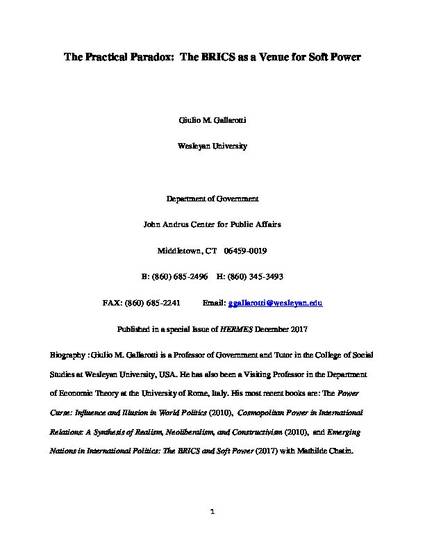
Article
The Practical Paradox: The BRICS as a Venue for Soft Power
Hermes
(2017)
Abstract
No one can contest the observation that the BRICS as a bloc appears to be an amalgamation of strange bedfellows. The common perception generated by this observation leads people to believe that such diversity acts as an impediment to the quest for enhancing national influence through the venue of an international bloc such as the BRICS. Indeed, in this age of growing regionalism among emerging powers, the common model of strength through amalgamation seems to underscore the power of similarity in building coalitions that marshal greater influence for emerging nations in the world system. An amalgamation like the BRICS is fairly unique in that it joins nations that are widely dispersed geographically and could not be more different in terms of social, political and cultural traits. Can birds of different species fly together and function effectively as a flock? This article argues that indeed they can. The article argues that great diversity not only does NOT inhibit the effectiveness of the BRICS as a bloc, indeed it demonstrates that greater diversity in fact augments the effectiveness of the BRICS as a vehicle for generating soft power in the international system for these nations. In the case of the BRICS, more diversity leads to greater influence.
Summarizing the principal argument of this article, the BRICS as a political-diplomatic entity modifies the soft power of its member states through a number of processes, in this article we will focus on one such process: augmentation. The process of augmentation enhances the soft power of each of the BRICS members in ways that have not yet heretofore been explored in the context of power analysis applied to any international organization. The findings in this analysis suggest that such a process is able to augment soft power in the context of blocs made up of even extremely diverse memberships. In fact, diversity can make the soft power augmentation all the greater. Hence, in this case, the greater differences among the members make the bloc as well as each member stronger. With respect to the main themes in the HERMES special issue, the arguments in this article suggest that common spaces can be carved out of diverse traits with respect to the member nations of the BRICS. Commonality of interests and goals can create a collective power space even among the most different kinds of nations.
The power augmentation of diversity could also enhance the hard power of the member nations of the BRICS, but here we concentrate on soft power because the BRICS as a bloc is principally a manifestation of soft power: i.e., power through diplomacy.
Keywords
- Soft Power,
- BRICS,
- Emerging Powers,
- Power
Disciplines
Publication Date
December, 2017
Citation Information
Giulio M Gallarotti. "The Practical Paradox: The BRICS as a Venue for Soft Power" Hermes Vol. 79 (2017) p. 183 - 191 Available at: http://works.bepress.com/giulio_gallarotti/51/
